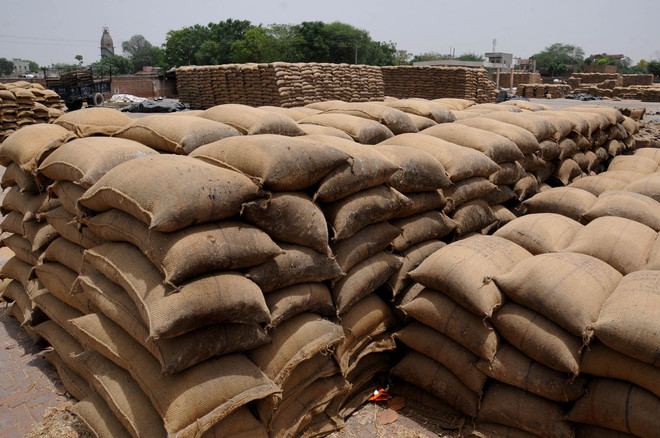Why Punjab sees scam in ‘unprecedented’ arrival of 4.7-lakh tonne paddy in its mandis on Diwali day
Kanchan Vasdev
Suspecting foul play in paddy procurement on Diwali day, Punjab Food, Civil Supplies and Consumer Affairs Secretary Gurkirat Kirpal Singh has asked the Vigilance Bureau to investigate the matter. What raised the red flag for the senior official is the procurement data for the day — an unprecedented 4.7 lakh tonne paddy arrived in the mandis on the Diwali. On the day, the markets remain near empty as the labourers, mostly migrants, stay home for the festival.
The needle of suspicion, officials and experts, say pointing towards illegal inflow of paddy from states such Uttar Pradesh and Bihar, from where it is bought on cheaper rates to be sold at Minimum Support Price (MSP) in Punjab.
This year, for the ongoing paddy procurement season, the Centre had announced the MSP of Rs 2,183 per quintal for wheat. The farmers in Uttar Pradesh and Bihar mostly sell their produce to the local traders who pick the produce at prices sometimes ranging as low as Rs 1,100 per quintal. Sources in the government say that usually the trucks, transporting goods to other states from Punjab, were filled with paddy and brought back. The paddy is then sent to mandis where it is procured allegedly in connivance with the staff, arhtiyas and traders. The middlemen make a killing, earning up to 100 per cent profit.
Why is it a problem
Punjab gets over Rs 40,000 crore from Centre for procurement of paddy for the central pool. During the last paddy procurement season, the state had received Rs 43,000 crore for procuring over 300 lakh tonnes of paddy. During the Congress regime in the state, the Centre had questioned how the procurement was at least 20 lakh tonne more than the estimated produce for the paddy grown in the state. It was alleged that the paddy was brought in from other states and sold here.
The state government, however, had countered saying that it was impossible to bring in such huge quantity paddy undetected into Punjab. The state said that to transport such massive amount, as many as 6,000 cargo trucks were needed and to transport at such magnitude, these trucks would not have been missed on the roads.
The farmer unions had started a campaign in 2020 to stop the trucks carrying paddy from other states at the Shambhu border in Punjab. Onkar Singh Agaul, general secretary of Bhartiya Kisan Union (Rajewal) had said that the racket had been going on for several years. The farmers protest as extra paddy being sold affects the disbursal of Cash Credit Limit (CCL) to state’s own farmers. The CCL released as first instalment gets over soon and the state has to then apply for the second instalment and the farmers have to wait.
Why has the issue taken centrestage
The arrival of 4.7 lakh tonnes on Diwali prompted Food and Civil Supplies Secretary to write to Special DGP Vigilance, Varinder Kumar to get the issue investigated. In a letter to Kumar on Monday, Gurkirat Kirpal requested that the matter should be treated as “most urgent” as this pointed to an attempt by “unscrupulous elements to recycle paddy and book fake purchases.”
In his letter, the secretary said, “The pattern of arrival of paddy in the past few days points to serious discrepancies. An unprecedented arrival of 4.7 lakh MT has been booked by market committee officials on Diwali where as such an arrival has never been experienced on this festive day since farmers are aware that the staff, labour and arhtiyas are not available.”
How the government had prepared
The government had prepared to stop arrival of paddy from other states by closing mandis in some districts including border districts. Substantial number of mandis were closed across the state including in Sangrur, Ropar, Pathankot, Hoshiarpur, Ferozepur, Fazilka and Muktsar as there were unsubstantiated reports of attempts to get paddy from neighbouring states into Punjab, the secretary wrote to Vigilance Bureau.
The closure of such mandis was to ensure that the remaining mandis were better monitored and such illegal attempts were checked. However, officials of market committees continued to accept paddy on subsequent days in closed mandis in complete violation of the directions. Gurkirat Kirpal wrote, “This matter also requires to be inquired into as it is very likely that the source of paddy in these purchase centres has not originated from Punjab.”
Till Monday, 166.91 lakh tonnes of paddy had arrived in the mandis. While most of the districts have harvested the crop, just over seven per cent of the crop is yet to be harvested in Bathinda belt.
This article has been republished from The Indian Express

